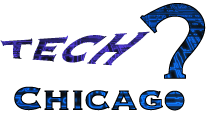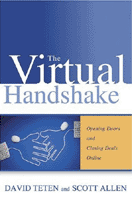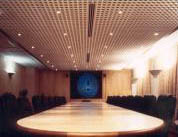Mobile Phones a Plum Market for Apple—If It Changes the Rules
 As mobile phones and smartphones become increasingly commonplace in mature and emerging markets, pundits increasingly predict that Apple will apply its design and experience expertise to field a mobile phone. Renowned for the elegance and simplicity of its devices and services, Apple provides unparalleled experience through world-class design of hardware, software and services. It delights and inspires customers by making the complex simple and beautiful. As mobile phones and smartphones become increasingly commonplace in mature and emerging markets, pundits increasingly predict that Apple will apply its design and experience expertise to field a mobile phone. Renowned for the elegance and simplicity of its devices and services, Apple provides unparalleled experience through world-class design of hardware, software and services. It delights and inspires customers by making the complex simple and beautiful.
The market for computing devices, wireless access and information (content) is at the point of convergence, and its value chain players—access providers, device makers and information providers—are vying to grow their influence. The digital device is rapidly becoming the hub for an unlimited number of information services. For many people, it is the main access device to the Internet, more than a computer. Within the market for devices, smartphones represent the convergence of PDAs and phones.
But the market for “music phones” is crippled by intractable value chain conflict. Can Apple use its core competency to create sustainable competitive advantage by changing the rules?
Are Rumors Grounded in a Solid Business Case?
The never-ending […]
High Potential for Business Innovation
 Plus ça change* was the theme of The Executives’ Club of Chicago High Technology Conference December eighth, where an esteemed panel gave varying perspectives on Chicago’s importance as a technology center. William Avery of Brunswick Corporation, James O’Connor, Jr. of Motorola, Inc. and Ira H. Cohen of Goldman, Sachs & Co. spoke about technology from enterprise IT, mobile technology and investment points of view respectively. Prior to their prepared remarks, John Gentry of CSC Consulting outlined key results of the forthcoming Chicago Technology Outlook Survey, in which corporate technology leaders commented on IT trends for 2007 as well as Chicago’s role as a technology center. He moderated the panel during a Q&A session. Plus ça change* was the theme of The Executives’ Club of Chicago High Technology Conference December eighth, where an esteemed panel gave varying perspectives on Chicago’s importance as a technology center. William Avery of Brunswick Corporation, James O’Connor, Jr. of Motorola, Inc. and Ira H. Cohen of Goldman, Sachs & Co. spoke about technology from enterprise IT, mobile technology and investment points of view respectively. Prior to their prepared remarks, John Gentry of CSC Consulting outlined key results of the forthcoming Chicago Technology Outlook Survey, in which corporate technology leaders commented on IT trends for 2007 as well as Chicago’s role as a technology center. He moderated the panel during a Q&A session.
The net-net: Chicago has a way to go before it becomes a preeminent technology center; however, its best chance for creating breakaway value through innovation will lie in not focusing on technology, as explained in Analysis and Conclusions.
[…]
 Consumer empowerment and disruption are being unleashed by the many-to-many Web. As we’ve been writing for some time, Web 2.0 is giving individuals collective voices that can rival the authority of global enterprises and governments, which is disruptive because it changes the rules. We call it Consumer Empowerment. Blogs, social networking, podcasts, wikis, vlogs and their intermediaries like Technorati, MySpace and iTunes give customers the tools to create and distribute content for free—instantly and globally. When rules change, you can quickly strengthen your market position by understanding and adapting more quickly than competitors. Consumer empowerment and disruption are being unleashed by the many-to-many Web. As we’ve been writing for some time, Web 2.0 is giving individuals collective voices that can rival the authority of global enterprises and governments, which is disruptive because it changes the rules. We call it Consumer Empowerment. Blogs, social networking, podcasts, wikis, vlogs and their intermediaries like Technorati, MySpace and iTunes give customers the tools to create and distribute content for free—instantly and globally. When rules change, you can quickly strengthen your market position by understanding and adapting more quickly than competitors.
Google any specific product, phrase or service, and you will notice that customer content is growing quickly, especially in specific, customer-centric areas that organizations aren’t focused on. Customers contribute customer-relevant content because they are passionate about the subject. Growing “tribes” of individuals connect, collaborate, and become smart very quickly. Threat: large organizations are losing control over the information about their reputations, products and services. Opportunity: adding value to these customer-led conversations can increase your credibility and appeal.
Large organizations attained their market power through efficiency, the hallmark of the […]
Excellent guidebook for succeeding in the online world, including social networking
 The Virtual Handshake is an immensely valuable book, both as a handbook to the virtual world for the business-oriented person and as a guide to purposeful networking. I was compelled to get it after seeing David Teten speak at a conference because he spoke with authority while explaining new things clearly. Allen and Teten have done a masterful job at writing an interesting book that is full of useful information. Moreover, they succeed at providing a conceptual framework, so the reader can make use of the information. It is also a fun read. The Virtual Handshake is an immensely valuable book, both as a handbook to the virtual world for the business-oriented person and as a guide to purposeful networking. I was compelled to get it after seeing David Teten speak at a conference because he spoke with authority while explaining new things clearly. Allen and Teten have done a masterful job at writing an interesting book that is full of useful information. Moreover, they succeed at providing a conceptual framework, so the reader can make use of the information. It is also a fun read.
As a marketing executive and a management consultant (strategy) since the early 1990s, I have helped to build parts of the virtual world the authors describe. I am very familiar with the topics, and I found the book useful on two key levels:
Conceptual: The virtual world is difficult to understand conceptually because it is boundaryless and serendipitous, and the authors describe what it is enough so you can get to the point: how to interact with it to accomplish what you want. This is extremely important […]
![Bank Wins Web 0.2 Citation for Delivering "Yechsperience" [customer experience satire]](http://rollyson.net/wp-content/uploads/2007/03/webdot2-logo.png) (**Updated) Marketing Outlays Sabotaged by Sub-par Process Execution (**Updated) Marketing Outlays Sabotaged by Sub-par Process Execution
Chicago, 29 November 2006—Today, the Global Human Capital Journal awarded Grace Bank, the top three credit card issuer, its notorious Web 0.2 Citation for inducing an acute spasm of customer yechsperience™.
This citation demonstrates how exceptionally poor service destroys brand despite kind words and happy pictures from Marketing. Although Grace employed a somewhat formulaic approach, it demonstrated laudable skill at producing customer irritation and angst.
[…]
The Knowledge Economy, Ultimate Context for Understanding the Future welcomes you to the Post-Industrial World, which turns past assumptions on their heads.
 The Knowledge Economy is a post-industrial economy characterized by a highly developed information technology industry along with overproduction and commoditization in industrial and agricultural sectors. Widespread information technology (IT) adoption among producers and consumers enables all market participants to create and share information about all aspects of economic transactions. The creation, packaging and sharing of information is termed “knowledge.” In the Knowledge Economy, information about an underlying good creates most of the good’s differentiated value. The Knowledge Economy is a post-industrial economy characterized by a highly developed information technology industry along with overproduction and commoditization in industrial and agricultural sectors. Widespread information technology (IT) adoption among producers and consumers enables all market participants to create and share information about all aspects of economic transactions. The creation, packaging and sharing of information is termed “knowledge.” In the Knowledge Economy, information about an underlying good creates most of the good’s differentiated value.
Consumer mobilization and engagement in the Knowledge Economy renders many of the Industrial Economy’s rules invalid. In the Industrial Economy, consumers had little information relative to producers, they were isolated from each other, and they had no collective voice. They were at a disadvantage as market participants. The “second stage” of the Internet, “Web 2.0,” facilitates P2P (peer to peer) information sharing, and its tools are free to use and accessible to anyone with an Internet connection. Producers […]
The TransAtlantic Partnership’s Implications for U.S., E.U. Economies summarizes coverage of the EEC International Conference—Talking with the Ambassadors of the World’s Largest Trading Relationship and the CEOs of Four Global Enterprises.
 Three eminent diplomatic leaders and CEOs from Baxter, Financial Dynamics, ITW and Philips briefed Midwest executives on the current status and future directions of the world’s largest trading relationship at the Executives’ Club of Chicago’s International Conference November 15. The half-day program featured several presentations, a CEO panel and a media round table. All speakers sought to impress upon the audience the pivotal importance of the transatlantic alliance for the United States and Europe, and most warned chief executives neither to take it for granted nor to be passive in the face of rising protectionism. Three eminent diplomatic leaders and CEOs from Baxter, Financial Dynamics, ITW and Philips briefed Midwest executives on the current status and future directions of the world’s largest trading relationship at the Executives’ Club of Chicago’s International Conference November 15. The half-day program featured several presentations, a CEO panel and a media round table. All speakers sought to impress upon the audience the pivotal importance of the transatlantic alliance for the United States and Europe, and most warned chief executives neither to take it for granted nor to be passive in the face of rising protectionism.
The fact that the importance of the E.U.—U.S. alliance had to be emphasized brought into sharp relief the relatively sudden rise of Asia as well as the shift from the Industrial Economy to the Knowledge Economy. Both megatrends pose opportunities and threats for the world’s largest economies and enterprises, and […]
Advice from three successful CIOs
 In the past 15 years, “enterprise IT” has been transformed from an accounting support function to the driver-enabler for innovation and value creation. By no means has this been a smooth transformation, as businesses in all industries are besieged by globalization, new competitors and rampant commoditization. At many companies, executives around the boardroom table have had mixed feelings about IT in the face of huge expenditures and uncertain ROIs. In the past 15 years, “enterprise IT” has been transformed from an accounting support function to the driver-enabler for innovation and value creation. By no means has this been a smooth transformation, as businesses in all industries are besieged by globalization, new competitors and rampant commoditization. At many companies, executives around the boardroom table have had mixed feelings about IT in the face of huge expenditures and uncertain ROIs.
At the Executives’ Club of Chicago High Technology Conference last week, Michael S. Carlin of Hospira, Richard Shellito of State Farm Insurance and Randy G. Burdick of OfficeMax shared their advice on keeping IT relevant in the boardroom. After their prepared remarks, Winifred A. Gillen of Capgemini moderated the panel during a Q&A session.
[…]
Peter Sondergaard opened the analyst firm’s vaunted annual Symposium/ITxpo this week by admonishing CIOs to prepare for a consumer shift that will reverse the current state in which business and government control customer and constituent relationships. As reported by eWeek, Gartner’s head of global research didn’t pull any punches: businesses will have to earn the right to justify premium offerings by empowering consumers:
 “The impact of consumerization is the most important trend impacting IT in the next 10 years,” Sondergaard remarked. “There will be a shift in culture reflecting the dominance of the ‘digital natives.’ Consumer technology will be integrated into (the) home, home office, in transit or recreational areas, and users will initiate interactions from all of these settings.” “The impact of consumerization is the most important trend impacting IT in the next 10 years,” Sondergaard remarked. “There will be a shift in culture reflecting the dominance of the ‘digital natives.’ Consumer technology will be integrated into (the) home, home office, in transit or recreational areas, and users will initiate interactions from all of these settings.”
[…]
If you have started to get the feeling that something new and big is afoot in the consumer Web world, no, you’re not having flashbacks to 1997
 Web 2.0 is a new phenomenon that is beginning to realign the balance of power between producers/providers of products/services and customers because it enables customers to self-organize and wield unprecedented influence in the market. “Web 2.0” refers to a group of (usually) free user-friendly Web applications like blogs, wikis, integrated video/phone services and social networking sites (more below) that enable individuals to connect, collaborate and concatenate with unprecedented ease. E-Commerce (doesn’t it sound quaint now?) first enabled consumers to gain a new level of information about products and services and, as adoption proceeded, to buy over the Web. That was “Web 1.0” and it was still largely one-way communication because information flowed from the Web to customers. “Web 2.0” is focused on letting individuals self-organize, interact, collaborate and be equal players in what aficionados call “the conversation” of the Web. Web 2.0 is a new phenomenon that is beginning to realign the balance of power between producers/providers of products/services and customers because it enables customers to self-organize and wield unprecedented influence in the market. “Web 2.0” refers to a group of (usually) free user-friendly Web applications like blogs, wikis, integrated video/phone services and social networking sites (more below) that enable individuals to connect, collaborate and concatenate with unprecedented ease. E-Commerce (doesn’t it sound quaint now?) first enabled consumers to gain a new level of information about products and services and, as adoption proceeded, to buy over the Web. That was “Web 1.0” and it was still largely one-way communication because information flowed from the Web to customers. “Web 2.0” is focused on letting individuals self-organize, interact, collaborate and be equal players in what aficionados call “the conversation” of the Web.
Before you B2B-focused readers yawn and turn the page, consider that this will turn […]
|
|
 As mobile phones and smartphones become increasingly commonplace in mature and emerging markets, pundits increasingly predict that Apple will apply its design and experience expertise to field a mobile phone. Renowned for the elegance and simplicity of its devices and services, Apple provides unparalleled experience through world-class design of hardware, software and services. It delights and inspires customers by making the complex simple and beautiful.
As mobile phones and smartphones become increasingly commonplace in mature and emerging markets, pundits increasingly predict that Apple will apply its design and experience expertise to field a mobile phone. Renowned for the elegance and simplicity of its devices and services, Apple provides unparalleled experience through world-class design of hardware, software and services. It delights and inspires customers by making the complex simple and beautiful.
 Plus ça change* was the theme of The Executives’ Club of Chicago High Technology Conference December eighth, where an esteemed panel gave varying perspectives on Chicago’s importance as a technology center. William Avery of Brunswick Corporation, James O’Connor, Jr. of Motorola, Inc. and Ira H. Cohen of Goldman, Sachs & Co. spoke about technology from enterprise IT, mobile technology and investment points of view respectively. Prior to their prepared remarks, John Gentry of CSC Consulting outlined key results of the forthcoming Chicago Technology Outlook Survey, in which corporate technology leaders commented on IT trends for 2007 as well as Chicago’s role as a technology center. He moderated the panel during a Q&A session.
Plus ça change* was the theme of The Executives’ Club of Chicago High Technology Conference December eighth, where an esteemed panel gave varying perspectives on Chicago’s importance as a technology center. William Avery of Brunswick Corporation, James O’Connor, Jr. of Motorola, Inc. and Ira H. Cohen of Goldman, Sachs & Co. spoke about technology from enterprise IT, mobile technology and investment points of view respectively. Prior to their prepared remarks, John Gentry of CSC Consulting outlined key results of the forthcoming Chicago Technology Outlook Survey, in which corporate technology leaders commented on IT trends for 2007 as well as Chicago’s role as a technology center. He moderated the panel during a Q&A session. Consumer empowerment and disruption are being unleashed by the many-to-many Web. As we’ve been writing for some time, Web 2.0 is giving individuals collective voices that can rival the authority of global enterprises and governments, which is disruptive because it changes the rules. We call it Consumer Empowerment. Blogs, social networking, podcasts, wikis, vlogs and their intermediaries like Technorati, MySpace and iTunes give customers the tools to create and distribute content for free—instantly and globally. When rules change, you can quickly strengthen your market position by understanding and adapting more quickly than competitors.
Consumer empowerment and disruption are being unleashed by the many-to-many Web. As we’ve been writing for some time, Web 2.0 is giving individuals collective voices that can rival the authority of global enterprises and governments, which is disruptive because it changes the rules. We call it Consumer Empowerment. Blogs, social networking, podcasts, wikis, vlogs and their intermediaries like Technorati, MySpace and iTunes give customers the tools to create and distribute content for free—instantly and globally. When rules change, you can quickly strengthen your market position by understanding and adapting more quickly than competitors. The Virtual Handshake is an immensely valuable book, both as a handbook to the virtual world for the business-oriented person and as a guide to purposeful networking. I was compelled to get it after seeing David Teten speak at a conference because he spoke with authority while explaining new things clearly. Allen and Teten have done a masterful job at writing an interesting book that is full of useful information. Moreover, they succeed at providing a conceptual framework, so the reader can make use of the information. It is also a fun read.
The Virtual Handshake is an immensely valuable book, both as a handbook to the virtual world for the business-oriented person and as a guide to purposeful networking. I was compelled to get it after seeing David Teten speak at a conference because he spoke with authority while explaining new things clearly. Allen and Teten have done a masterful job at writing an interesting book that is full of useful information. Moreover, they succeed at providing a conceptual framework, so the reader can make use of the information. It is also a fun read.![Bank Wins Web 0.2 Citation for Delivering "Yechsperience" [customer experience satire]](http://rollyson.net/wp-content/uploads/2007/03/webdot2-logo.png) (**Updated) Marketing Outlays Sabotaged by Sub-par Process Execution
(**Updated) Marketing Outlays Sabotaged by Sub-par Process Execution  The Knowledge Economy is a post-industrial economy characterized by a highly developed information technology industry along with overproduction and commoditization in industrial and agricultural sectors. Widespread information technology (IT) adoption among producers and consumers enables all market participants to create and share information about all aspects of economic transactions. The creation, packaging and sharing of information is termed “knowledge.” In the Knowledge Economy, information about an underlying good creates most of the good’s differentiated value.
The Knowledge Economy is a post-industrial economy characterized by a highly developed information technology industry along with overproduction and commoditization in industrial and agricultural sectors. Widespread information technology (IT) adoption among producers and consumers enables all market participants to create and share information about all aspects of economic transactions. The creation, packaging and sharing of information is termed “knowledge.” In the Knowledge Economy, information about an underlying good creates most of the good’s differentiated value. Three eminent diplomatic leaders and CEOs from Baxter, Financial Dynamics, ITW and Philips briefed Midwest executives on the current status and future directions of the world’s largest trading relationship at the Executives’ Club of Chicago’s International Conference November 15. The half-day program featured several presentations, a CEO panel and a media round table. All speakers sought to impress upon the audience the pivotal importance of the transatlantic alliance for the United States and Europe, and most warned chief executives neither to take it for granted nor to be passive in the face of rising protectionism.
Three eminent diplomatic leaders and CEOs from Baxter, Financial Dynamics, ITW and Philips briefed Midwest executives on the current status and future directions of the world’s largest trading relationship at the Executives’ Club of Chicago’s International Conference November 15. The half-day program featured several presentations, a CEO panel and a media round table. All speakers sought to impress upon the audience the pivotal importance of the transatlantic alliance for the United States and Europe, and most warned chief executives neither to take it for granted nor to be passive in the face of rising protectionism. In the past 15 years, “enterprise IT” has been transformed from an accounting support function to the driver-enabler for innovation and value creation. By no means has this been a smooth transformation, as businesses in all industries are besieged by globalization, new competitors and rampant commoditization. At many companies, executives around the boardroom table have had mixed feelings about IT in the face of huge expenditures and uncertain ROIs.
In the past 15 years, “enterprise IT” has been transformed from an accounting support function to the driver-enabler for innovation and value creation. By no means has this been a smooth transformation, as businesses in all industries are besieged by globalization, new competitors and rampant commoditization. At many companies, executives around the boardroom table have had mixed feelings about IT in the face of huge expenditures and uncertain ROIs. “The impact of consumerization is the most important trend impacting IT in the next 10 years,” Sondergaard remarked. “There will be a shift in culture reflecting the dominance of the ‘digital natives.’ Consumer technology will be integrated into (the) home, home office, in transit or recreational areas, and users will initiate interactions from all of these settings.”
“The impact of consumerization is the most important trend impacting IT in the next 10 years,” Sondergaard remarked. “There will be a shift in culture reflecting the dominance of the ‘digital natives.’ Consumer technology will be integrated into (the) home, home office, in transit or recreational areas, and users will initiate interactions from all of these settings.” Web 2.0 is a new phenomenon that is beginning to realign the balance of power between producers/providers of products/services and customers because it enables customers to self-organize and wield unprecedented influence in the market. “Web 2.0” refers to a group of (usually) free user-friendly Web applications like blogs, wikis, integrated video/phone services and social networking sites (more below) that enable individuals to connect, collaborate and concatenate with unprecedented ease. E-Commerce (doesn’t it sound quaint now?) first enabled consumers to gain a new level of information about products and services and, as adoption proceeded, to buy over the Web. That was “Web 1.0” and it was still largely one-way communication because information flowed from the Web to customers. “Web 2.0” is focused on letting individuals self-organize, interact, collaborate and be equal players in what aficionados call “the conversation” of the Web.
Web 2.0 is a new phenomenon that is beginning to realign the balance of power between producers/providers of products/services and customers because it enables customers to self-organize and wield unprecedented influence in the market. “Web 2.0” refers to a group of (usually) free user-friendly Web applications like blogs, wikis, integrated video/phone services and social networking sites (more below) that enable individuals to connect, collaborate and concatenate with unprecedented ease. E-Commerce (doesn’t it sound quaint now?) first enabled consumers to gain a new level of information about products and services and, as adoption proceeded, to buy over the Web. That was “Web 1.0” and it was still largely one-way communication because information flowed from the Web to customers. “Web 2.0” is focused on letting individuals self-organize, interact, collaborate and be equal players in what aficionados call “the conversation” of the Web.